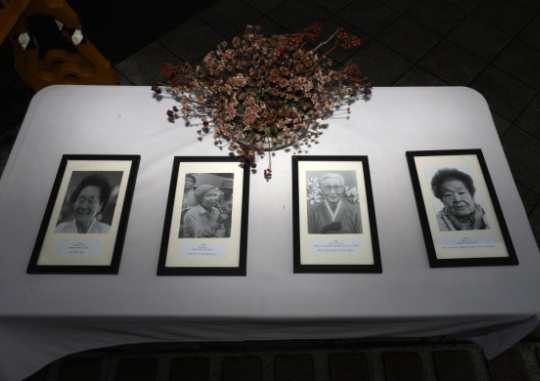Court to Announce Verdict on Comfort Women Case on Jan. 13: Will the Court Continue to Deny State Immunity for Anti-Humanitarian Crimes?
이 글자크기로 변경됩니다.
(예시) 가장 빠른 뉴스가 있고 다양한 정보, 쌍방향 소통이 숨쉬는 다음뉴스를 만나보세요. 다음뉴스는 국내외 주요이슈와 실시간 속보, 문화생활 및 다양한 분야의 뉴스를 입체적으로 전달하고 있습니다.
[경향신문]

The court ruled that state immunity could not be applied to anti-humanitarian crimes, such as sexual slavery in the Japanese military, and eyes are now on the possibility of a string of similar lawsuits by more victims.
At 2 p.m. January 13, Civil Division 15 (chief judge Min Seong-cheol) of the Seoul Central District Court is scheduled to announce its decision on a compensation claim for damages that twenty people, comfort women victims including the late Gwak Ye-nam and their families, filed against the Japanese government. The lawsuit was filed at the one-year anniversary of the comfort women agreement signed by the governments of South Korea and Japan in 2016, and reportedly, one of the plaintiffs, the elderly Lee Yong-soo will appear in court this day.
Last November, Lee stood in court and testified, “A fourteen year old girl was dragged away. She suffered damages, returned and now stands in this courtroom as an old woman of the Republic of Korea.” She also said, “I have been to the United States, and have filed lawsuits against Japan in the world’s courts, but I have yet to hear an answer on why I was taken by Japan. I have nowhere to turn to anymore. We are asking the judiciary of the Republic of Korea to resolve this.”
Previously, the comfort women victims filed a lawsuit against Japan at the U.S. Supreme Court in 2006 and at a Washington D.C. federal district court in 2009, but the cases were all closed due to state immunity. State immunity protects a sovereign state from being sued in the courts of other countries. But on January 8, Civil Division 34 (chief judge Kim Jeong-gon) of the Seoul Central District Court, for the first time, ruled that “State immunity cannot be applied to anti-humanitarian crimes,” in a claim for compensation filed by the late Bae Chun-hui, an elderly comfort women victim. Attorney Lee Sang-hee, the legal representative of the elderly Lee said, “Whether or not to recognize sovereignty when a state seriously violates human rights has been a controversial issue in international law and we witnessed rich discussions in the course of the trial.”
If the verdict in the trial of the comfort women victims, scheduled to be announced on January 13, is the same as the precedent, similar lawsuits may follow. After the Supreme Court ordered Japanese companies including Mitsubishi Heavy Industries to provide compensation to the victims of forced labor in 2018, other victims filed a string of lawsuits at the Seoul Central District Court.
But some experts argue that in reality, the more victims file similar lawsuits, the farther they push away the apology that the victims of sexual slavery and forced labor are seeking. Even if state immunity is not acknowledged, the court can only order the defendant to pay compensations, so eventually, an apology can only be encouraged through a diplomatic process. The Daejeon District Court seized assets amounting to 800 million won, including two domestic trademark rights, and six patents by Mitsubishi Heavy Industries according to the 2018 Supreme Court ruling. Thus the court has been able to sell the seized property since midnight December 30, but in reality, when considering diplomatic ties, it is not easy to execute such orders.
Copyright © 경향신문. 무단전재 및 재배포 금지.
- 네이버, 소프트뱅크에 ‘라인’ 경영권 뺏길판…일본 정부서 지분 매각 압박
- “육군은 철수...우린(해병) 한다” “사단장님이 ‘하라’ 하셨다”···채 상병 사건 녹취록 공
- 민희진 대표 “무속인이 불가촉천민? 개인 사찰로 고소할 것”
- 나경원, ‘윤 대통령 반대’ 헝가리 저출생 해법 1호 법안으로···“정부 대책이 더 과격”
- 공수처, ‘이정섭 검사 비위 폭로’ 강미정 조국혁신당 대변인 조사
- “매월 10만원 저금하면 두 배로”…다음주부터 ‘청년통장’ 신청 모집
- 아동 간 성범죄는 ‘교육’ 부재 탓···사설 성교육업체에 몰리는 부모들
- [초선 당선인 인터뷰] 천하람 “한동훈은 긁어 본 복권…정치 리더로서 매력 없어져”
- 니카라과, “재정 악화” 이유로 한국 대사관 철수 통보
- 현대차, 차량 내부 20℃ 이상 낮춰주는 틴팅필름 개발…‘뙤약볕’ 파키스탄서 실증